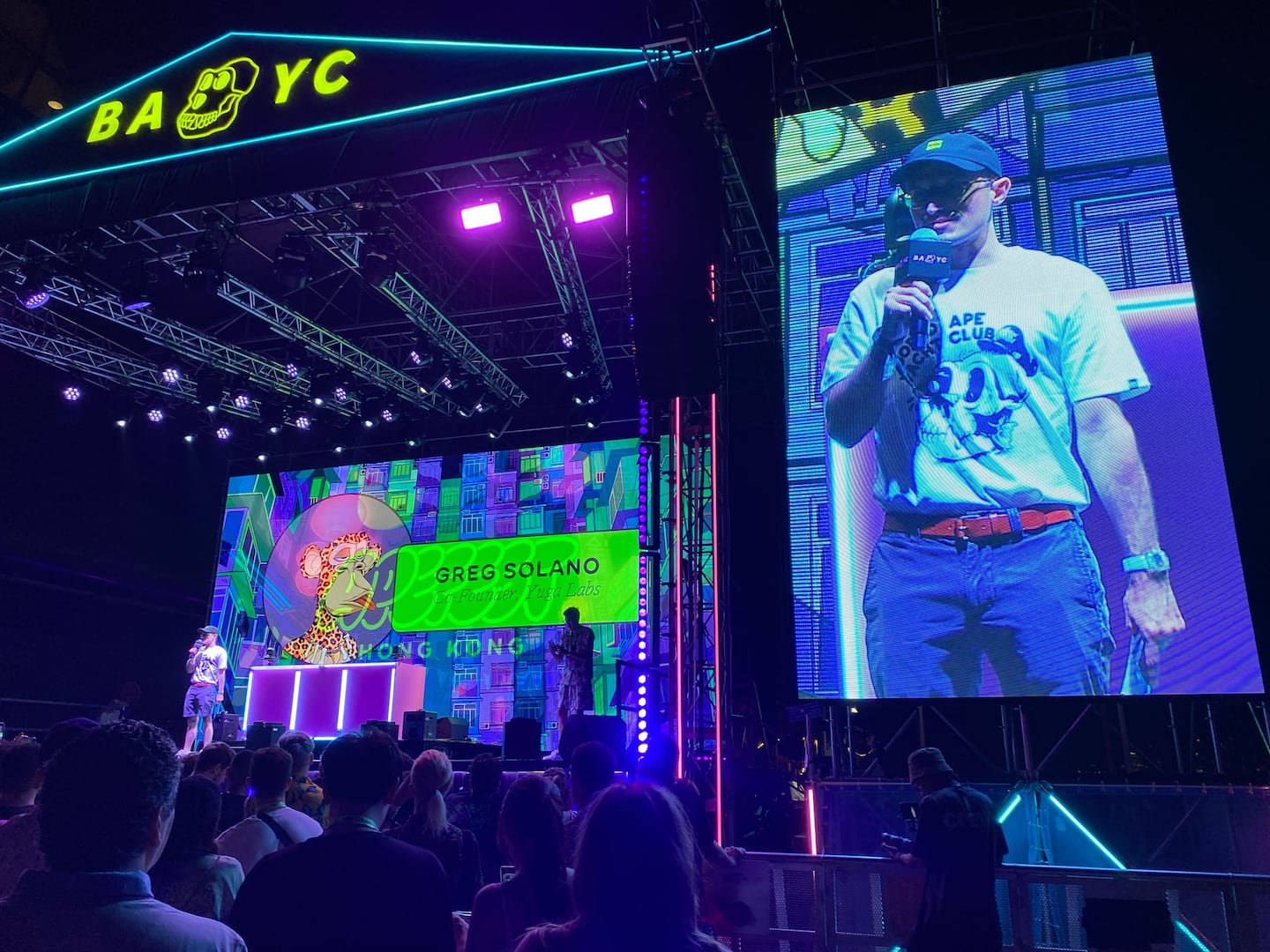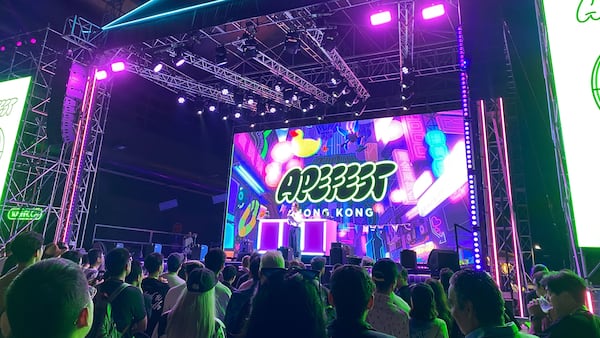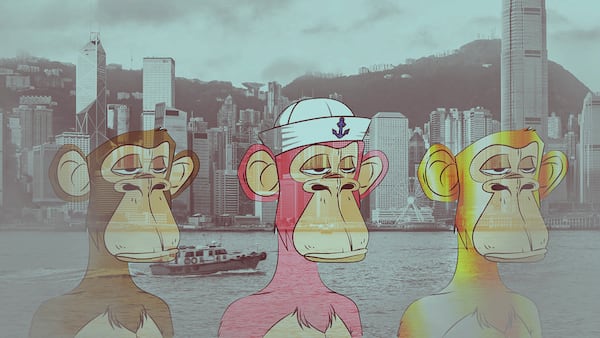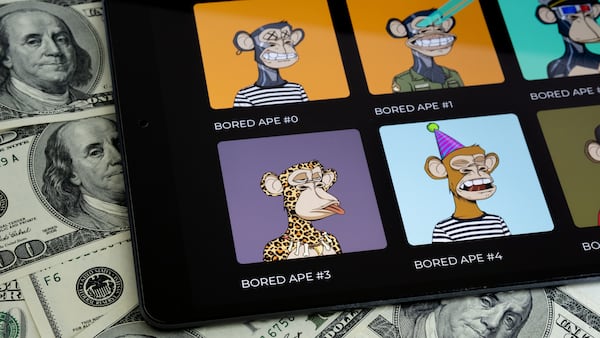At first glance, the queue for the noodle stall at ApeFest Hong Kong 2023 could have been mistaken for an event in the metaverse platform VR Chat: The outfits were more like gaming skins or wearables than things people would actually put on in real life.
A girl adorned in banana-print trousers carrying two massive canvas portraits of her Bored Ape Yacht Club NFTs, a duo draped in blue kimonos, a man engrossed in phone chatter about how the “true alpha” at the event was that the food was, in fact, free.
It was a slightly hipster version of an advert for Horizon Worlds. Or live action role-playing a Decentraland rave. Or maybe I’ve just spent too much time online and can no longer tell the difference between what’s real and what isn’t.
There were yacht club captain hats, Hawaiian shirts, a troupe in neon tracksuits. One man had paired Bermuda shorts with a tuxedo. Even the tamer dressers seemed to have made their own T-shirts.
Members of Elite Apes Hong Kong wore matching tees paired with bright pink pyjama bottoms. Bored Lah — a Bored Ape Yacht Club group from Malaysia — had the club name across their backs. There were “Apes” — as the NFT holders called themselves — from all over: the UK, the US, France, Japan, China, Turkey, Russia, New Zealand, Brazil, you name it.
And they’d all descended into Hong Kong’s former airport, which now functions as a cruise terminal and an occasional events space.
Kai Tak is a bit off the beaten path as far as popular spots in the city go. But it was here that Yuga Labs chose to hold its third edition of ApeFest, and after two years in New York, the first outside the US. The move was popular with its many Asia-based fans and marked a high-profile NFT event for Hong Kong as it attempts to reinvent itself as a web3 hub.
From the jovial mood, you wouldn’t have thought it’d been a tough year for Yuga Labs. As with many blue-chip NFT collections in the bear market, its floor price is down. It currently stands at 28 ETH, almost 82% lower than the all-time high of 154 ETH in May 2022, according to CryptoSlam.
And just last month, the $4 billion startup laid off an undisclosed number of employees. CEO Daniel Alegre said that the company needed to refocus after having taken on too many projects and spread itself too thin.
Fighting back on royalties
Of the four Yuga Labs founders, only Greg Solano, aka Gargamel, was in attendance. He took to the stage after a meme-and-tweet heavy video poked fun at those who disparaged NFTs and showcased some community projects. His presence onstage was met with one guy at the back of the crowd who twice tried to start a “Garga, Garga” chant. It failed.

Solano’s announcement of Yuga Labs’ new venture with Magic Eden got the most applause. The two plan to release a marketplace designed to enforce royalties at the end of the year, the latest shot fired in an ongoing battle between creators and sellers over whether people should have to pay artists each time they buy or sell an NFT.
Admittedly though, plenty of people told me after that they were guilty of occasionally buying an NFT without royalties.
Evangelists and sceptics
The heart of the festival thumped with mixed beats. At the entrance, the blend of digital art and luxury branding was epitomised by a collaboration with BMW. Here, holders of Bored Apes queued to see their NFTs projected onto cars, snapping photos as their own NFTs appeared.
Why would someone want to do this? I don’t know.

Maybe it was the die-hard evangelists preaching the digital gospel of web3. They lectured those around them with the usual stock phrases about “onboarding the next billion users to web3″ and how they were all “so early.” Or the networkers weaving through the crowd seeking business opportunities.
But amid the fervour, there were onlookers like me, slightly bemused and disconnected from the revelry. You could tell who was an owner and who wasn’t: Holders had their NFTs in lanyards around their neck; the rest of us had to make do with mere wristbands.
Even some of the lanyard-wearers seemed genuinely confused about how they had even got to the point in their life where they were flying halfway around the world to attend a party based on monkey jpegs. Some excitedly told me this was the future of “community,” others confided their letdown over a Bored Ape-branded beer.
As the evening wore on, conversations drifted from grand visions of the future to where to find the best late-night dim sum — and tomorrow’s red-eye flights so that attendees could get to work Monday morning.
Of course, people having fun and enjoying each other’s company doesn’t necessarily determine whether Yuga Labs — or any NFT collection — will one day achieve mainstream success. I’m still not sure if they’re a bizarre blip on the radar of the financial world or the next big thing. My mother laughed at me when I tried to explain what ApeFest was.
And as I left Kai Tak, the haze of the festival gave way to the familiar hum of the city. The Apes might have had their moment, but few outside the community paid attention.
Got a Hong Kong crypto story? Contact me at callan@dlnews.com.




